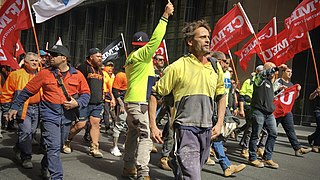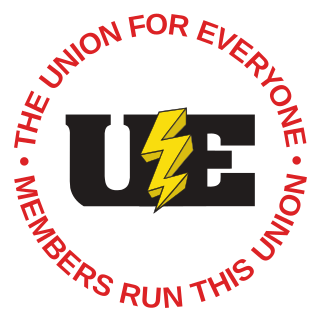Related Research Articles

The National Labor Relations Act of 1935 is a foundational statute of United States labor law that guarantees the right of private sector employees to organize into trade unions, engage in collective bargaining, and take collective action such as strikes. Central to the act was a ban on company unions. The act was written by Senator Robert F. Wagner, passed by the 74th United States Congress, and signed into law by President Franklin D. Roosevelt.

The Labor Management Relations Act of 1947, better known as the Taft–Hartley Act, is a United States federal law that restricts the activities and power of labor unions. It was enacted by the 80th United States Congress over the veto of President Harry S. Truman, becoming law on June 23, 1947.

Strike action, also called labor strike, labour strike, or simply strike, is a work stoppage, caused by the mass refusal of employees to work. A strike usually takes place in response to employee grievances. Strikes became common during the Industrial Revolution, when mass labor became important in factories and mines. In most countries, strike actions were quickly made illegal, as factory owners had far more power than workers. Most Western countries partially legalized striking in the late 19th or early 20th centuries.

United Kingdom labour law regulates the relations between workers, employers and trade unions. People at work in the UK can rely upon a minimum charter of employment rights, which are found in Acts of Parliament, Regulations, common law and equity. This includes the right to a minimum wage of £9.50 for over-23-year-olds from April 2022 under the National Minimum Wage Act 1998. The Working Time Regulations 1998 give the right to 28 days paid holidays, breaks from work, and attempt to limit long working hours. The Employment Rights Act 1996 gives the right to leave for child care, and the right to request flexible working patterns. The Pensions Act 2008 gives the right to be automatically enrolled in a basic occupational pension, whose funds must be protected according to the Pensions Act 1995.
Trade unions in Malaysia are regulated by the Trade Unions Act of 1959.
Enterprise bargaining is an Australian term for a form of collective bargaining, in which wages and working conditions are negotiated at the level of the individual organisations, as distinct from sectoral collective bargaining across whole industries. Once established, they are legally binding on employers and employees that are covered by the Enterprise bargaining agreement. An Enterprise Agreement (EA) consists of a collective industrial agreement between either an employer and a trade union acting on behalf of employees or an employer and employees acting for themselves.

The United Electrical, Radio and Machine Workers of America (UE), is an independent democratic rank-and-file labor union representing workers in both the private and public sectors across the United States.
The 1890 Australian maritime dispute was an industrial dispute that began on 15 August 1890 when the Mercantile Marine Officers' Association directed its members to give 24 hours' notice to their employers after negotiations broke down with the Steamship Owners' Association of Victoria over longstanding pay and conditions claims. Industrial action quickly spread to seamen, wharf labourers, then gas stockers. Coal miners from Newcastle, Broken Hill, and even New Zealand were locked out after refusing to dig coal for non-union operated vessels. By September 1890, 28,500 workers were on strike.
Overtime bans are a type of strike in which workers refuse to engage in overtime work, being any work that falls outside of contracted hours. They do this to leverage their employer into negotiating various working conditions. Often organised in unions, workers may choose this form of industrial action to bargain for a higher rate of pay, better working conditions or to discourage an employer from making redundancies. Unlike a full strike in which employees are usually in breach of their contract, workers engaging in overtime bans are typically well protected. Employers cannot legally withhold normal wages during an overtime ban if employees are not breaching the terms of their employment contracts by refusing to do overtime work. However, the legalities of overtime bans do vary between countries. Overtime bans are effective where "industries and organisations run on such habitually high levels of overtime or goodwill that overtime bans ... can have a significant and immediate impact upon the availability of a good or service". Historically, unions have at times received criticism on ethical grounds for choosing to enact overtime bans. The literature records the occurrence of such bans from the 1800s and there is documentation of their use in four continents.
The Trade Union and Labour Relations (Consolidation) Act 1992 is a UK Act of Parliament which regulates United Kingdom labour law. The Act applies in full in England and Wales and in Scotland, and partially in Northern Ireland.
Japanese labour law is the system of labour law operating in Japan.
The Employment Rights Act 1996 is a United Kingdom Act of Parliament passed by the Conservative government to codify existing law on individual rights in UK labour law.

The New Zealand Employment Relations Act 2000 is a statute of the Parliament of New Zealand. It was substantially amended by the Employment Relations Amendment Act 2001 and by the ERAA 2004.
A wildcat strike action, often referred to as a wildcat strike, is a strike action undertaken by unionized workers without union leadership's authorization, support, or approval; this is sometimes termed an unofficial industrial action. The legality of wildcat strikes varies between countries and over time, although they are not typically criminal offenses.
A whipsaw strike is a strike by a trade union against only one or a few employers in an industry or a multi-employer association at a time. The strike is often of a short duration, and usually recurs during the labor dispute or contract negotiations—hence the name "whipsaw".
The Leadville miners' strike was a labor action by the Cloud City Miners' Union, which was the Leadville, Colorado local of the Western Federation of Miners (WFM), against those silver mines paying less than $3.00 per day. The strike lasted from 19 June 1896 to 9 March 1897, and resulted in a major defeat for the union, largely due to the unified opposition of the mine owners. The failure of the strike caused the WFM to leave the American Federation of Labor (AFL), and is regarded as a cause for the WFM turn toward revolutionary socialism.
A labor dispute is a disagreement between an employer and employees regarding the terms of employment. This could include disputes regarding conditions of employment, fringe benefits, hours of work, tenure, and wages to be negotiated during collective bargaining, or the implementation of already agreed upon terms. It could further concern the association or representation of those who negotiate or seek to negotiate the terms or conditions of employment.

The International Longshore and Warehouse Union (ILWU) is a labor union which primarily represents dock workers on the West Coast of the United States, Hawaii, and in British Columbia, Canada. The union was established in 1937 after the 1934 West Coast Waterfront Strike, a three-month-long strike that culminated in a four-day general strike in San Francisco, California, and the Bay Area. It disaffiliated from the AFL–CIO on August 30, 2013.
The labour movement or labor movement consists of two main wings: the trade union movement or labor union movement on the one hand, and the political labour movement on the other.
The 2021 Heaven Hill strike was a labor strike involving about 420 workers for the Heaven Hill bourbon whiskey distillery in Bardstown, Kentucky, United States. These workers are members of the United Food and Commercial Workers Local 23D and were on strike since September 11. The labor dispute is over the terms of a new five-year labor contract between the union and the company, which is one of the largest bourbon producers in the world. In particular, union members were concerned about "gray areas" in the contract that they believed could lead to union employees working weekends and extra overtime without pay. Additional concerns from the union were over reduced take-home pay and a removal of the limit on premiums for health care insurance. On September 9, union members voted by about 96 percent to reject the proposed contract and authorized strike action. As a result, the union's existing contract expired without replacement on September 10 and striking commenced the following day.
References
- ↑ "The Right to Strike | National Labor Relations Board". www.nlrb.gov. Retrieved 2022-05-14.